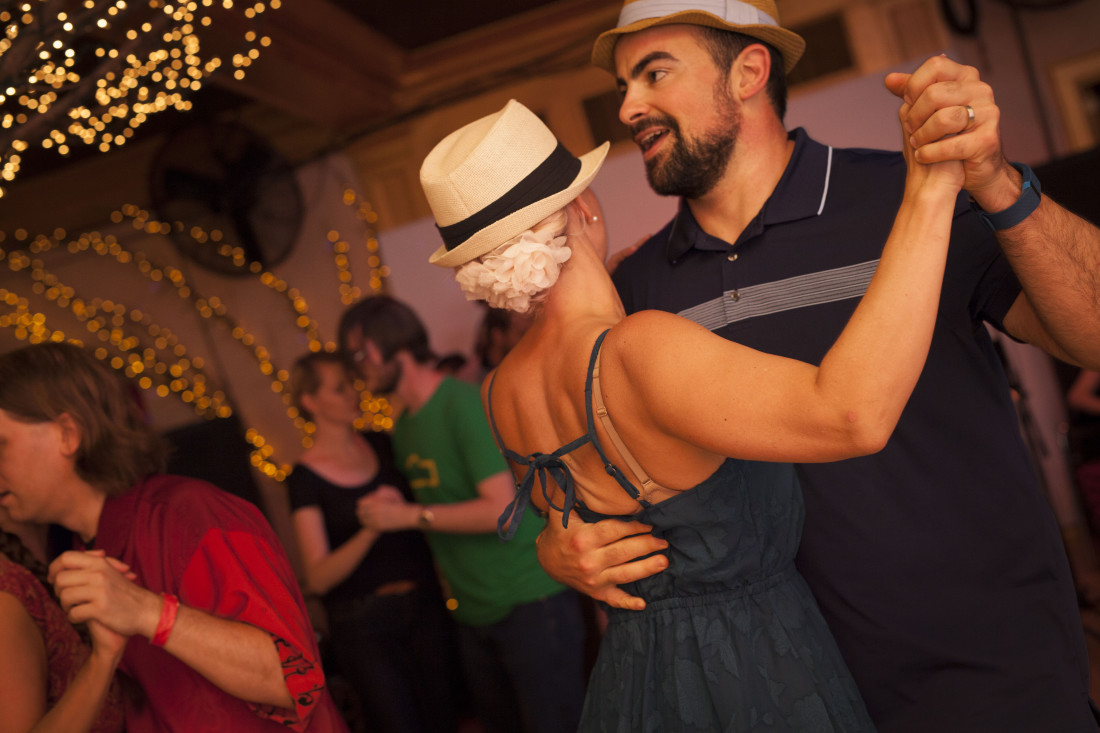Even if it doesn’t necessarily look that way from the outside, swing dance provides “a community where people who don’t fit in somewhere else can find a home,” says Franklin Smith, a representative of Swing Asheville. The local organization hosts a variety of dance events, from lessons to social gatherings that, of course, center on swing dance moves and music.
The group recently relocated its weekly events to The BLOCK off Biltmore and is now part of that venue’s Tuesday night Jazz N’ Justice series, which benefits a different charity each week through donations and a percentage of bar sales. The first dances at the new location benefited the Women’s March on Asheville. “One of the reasons Swing Asheville was interested in partnering with nonprofits is that we are a nonprofit as well,” says Smith. “All of the organizers are volunteers, and our main focus is providing a time and place for folks to gather and learn about vintage music and dance.”
Plus, “We’re all pretty optimist-minded,” says Smith of Swing Asheville’s members. “The idea is to do more than just have a dance.” The Tuesday, Feb. 14, event is appropriately Valentine’s Day-themed, with music by The Lovebugs.
Beyond the social justice component, the Tuesday night sessions offer lessons to beginners as well as intermediate instruction to those with some experience, and there’s also a dose of history. Bands that play the dances lean toward traditional jazz from the ’20s, ’30s and ’40s, such as The Low-Down Sires (“dedicated to the lost sounds of early jazz”), The Posey Quartet (“rhythm-centric arrangements of hot jazz and swing obscurities”), The House Hoppers (“swinging jazz and early-20th-century vintage pop”) and Sparrow & Her Wingmen (“early ragtime-pop to New Orleans blues”). Sparrow Pants, who fronts the latter, coordinates the weekly benefit aspect of the Jazz N’ Justice series.
“We call it vintage,” says Smith. “There are different styles [of dance] that are represented. The Charleston is the earliest form of swing dance. There’s even different styles of Charleston. The Lindy Hop came a little bit later. We do dance all the styles.”
Smith is a fan of the Balboa, which originated in the ’30s and ’40s, around the time of the Lindy Hop. It’s characterized by full-body connection — something Smith thinks is often missing from contemporary socializing. Swing dance remains relevant, he says, because so much of most people’s time is spent online. “To go out in the community and interact with people face to face is something that’s really hard to find nowadays,” he says.
“I think it’s superimportant that we get off Facebook and get out of the house. Exploring physical components” — through safe channels, such as a partner dance events — “is not something everyone has a chance to do anymore.” Dance, Smith says, counteracts a lot of the isolation that is common in modern society.
One thing local swing dance enthusiasts need never feel is isolated. Beyond the weekly gatherings at The BLOCK off Biltmore, the website DanceAsheville.com lists a number of opportunities to cut a rug in various locations around Western North Carolina, with moves ranging from Lindy and West Coast swing, to other styles like bachata and blues.
The annual Lindy Focus — which just celebrated its 15th year and is held in Asheville — “is an all-encompassing celebration of swing, featuring many of the world’s best dance instructors and the best live music on the planet,” according the the event’s website. Plus, says Smith, “We like to dress up. The vintage dance, the vintage music and vintage attire and hairstyles go along with it. There’s a whole subculture, which was really in effect at Lindy Focus. People go all out.” Plan to dress accordingly for the Valentine’s Day dance.
The Blue Ridge Bal, held June 30 to July 2, promises “Balboa workshops, amazing music [and] tubing.” The riparian entertainment, in past years, included a float down the French Broad complete with water-proof instruments. “We wanted to create an event to help grow the regional and local Balboa scene,” Smith says. “Some of the fun things we did was a flash mob that we called a shuffle mob. We danced down the sidewalks and did a routine at Pritchard Park.”
The spirit of fun extends to newcomers. If, in the past, swing dance communities have been criticized for been exclusive, “We’ve really made it a point to cultivate an environment where anyone can come and feel welcome,” Smith says. The move to The BLOCK off Biltmore aids that goal by making possible a lower cover charge and bolstering community spirit.
At the events, some dancers are experienced, and others are new to swing, “but everyone has a good time,” Smith promises. He does caution that, unlike contra dance — a style that can be picked up within a couple of nights, because the moves are called and there’s no footwork involved — swing dance takes some work to master. But the lessons offered in advance of the weekly fêtes address that learning curve and, as Smith points out, “There’s no wrong way to dance.”
WHAT: Swing Asheville, swingasheville.com
WHERE: The BLOCK off Biltmore, 39 S. Market St., theblockoffbiltmore.com
WHEN: Every Tuesday. Beginner lesson at 8 p.m., $10. Dance at 9 p.m., $5






Before you comment
The comments section is here to provide a platform for civil dialogue on the issues we face together as a local community. Xpress is committed to offering this platform for all voices, but when the tone of the discussion gets nasty or strays off topic, we believe many people choose not to participate. Xpress editors are determined to moderate comments to ensure a constructive interchange is maintained. All comments judged not to be in keeping with the spirit of civil discourse will be removed and repeat violators will be banned. See here for our terms of service. Thank you for being part of this effort to promote respectful discussion.